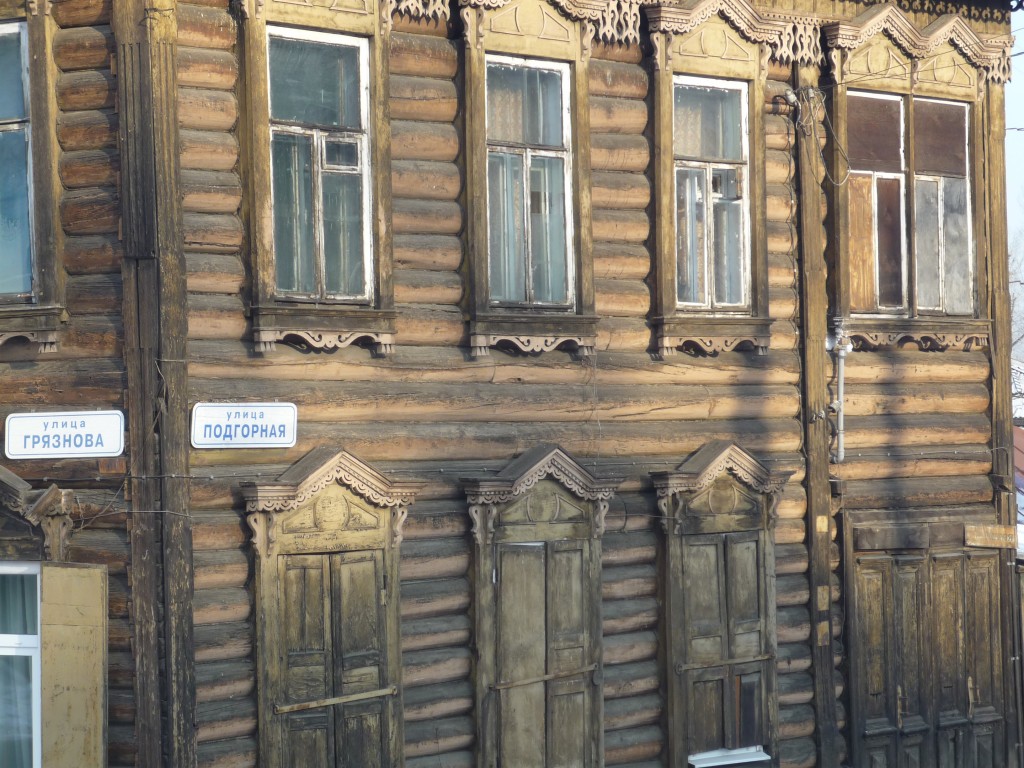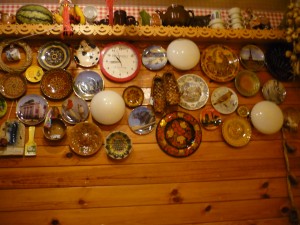Dec. 3 – Irkutsk
At the Mongolia-Russia border, at midnight, the Russians used a German Shepherd to search the train, after the Mongolian Cocker Spaniel had sniffed around. Neither found anything of interest in my compartment, but I still watched the dogs with some apprehension. Earlier, a Mongolian woman had tried to convince me to hide some goods to help her avoid paying duty on them. I refused, earning a rude gesture suggesting I was dismally underendowed. Later I checked my entire compartment to make sure there was nothing stashed away that could be pinned on me.
In the morning, the train skirted Lake Baikal for a couple of hours. We approached Irkutsk to gentle flurries, much to the delight of the Australian passenger, who had never seen snow fall.Walking from the station, I got to my homestay easily. I have a cheap, comfortable room in the cozy wood-paneled home of a German-speaking woman.
Last night and today I walked around Irkutsk. It’s not a small place, but after two weeks in China’s megacities, it felt quaint, human-scaled, easy to negotiate. There are many old wooden buildings. One could say they have a rustic charm, which is a polite way of saying something used to look better. But after the imposing, never ending concrete phalanx of apartments in China, these distressed houses, with their crooked frames and cracked paint, were a small comfort.
My first dinner in Russia was at a sushi place on Ulitsa Karla Marksa. Service was slow, but I had no reason to hurry. It was the sort of mellow, mood-lit place that plays acoustic, soulful covers of U2’s “With or without you”. The guy at the table next to me tried to figure out chopsticks. Another pulled out an iPad. Three young women drank tea and smoked. I had a hearty fish soup, and seafood mixed with rice. The waitress (the designated English-speaker) asked me:
“What do you think about Irkutsk?”
“I don’t know yet. I’ve only been here two hours. The meal was nice.”
“It is very cold now.”
“Yes, but I am from Canada.”
That was a lame response. I’ve been living in Vancouver, which has made me soft. It was -15 C that night. Those low temperatures have held, so my Siberian rambling on foot requires a different approach. It means dressing up to spend the entire day outside – boots, heavy socks, longjohns, fleece-lined trousers, five layers up top including overcoat, wool/Gore-tex cap, gloves. It also means marching at commuter speed on the icy, lumpy sidewalks rather than ambling along. My face remains exposed. The bristles of my beard keep freezing, and the metal of my glasses stings the bridge of my nose. Yes, I chose this experience. Siberia is not famous for its summers.
Today is Saturday, so Irkutsk was shopping. At outdoor bazaars, all sorts of cheap goods were on offer including the usual plastic Christmas kitsch. From loudspeakers, the cold air carried the voices of famous crooners. First Elvis’ “My Way”, then, perhaps an indication of Russian humour; Ella Fitzgerald’s smooth “I love Paris in the springtime”. At the large indoor market shoppers got their groceries. Fruits and vegetables (imported and expensive), salads, pickles, cheeses. Heaps of frozen, surprised-looking fish. Behind large refrigerated displays of red animal flesh a butcher looked on, hands and forearms flecked with blood.
I misread the bus schedule to Lake Baikal (actually, the truth is I forgot to adjust my watch to account for the time zone change), and will go tomorrow. This means an extra day in Irkutsk, which I do not regret at all.
Thank you for your Siberian Idol votes. The final tally, with all polls reporting, was:
Novosibirsk: 9
Omsk: 6
Krasnoyarsk: 2






